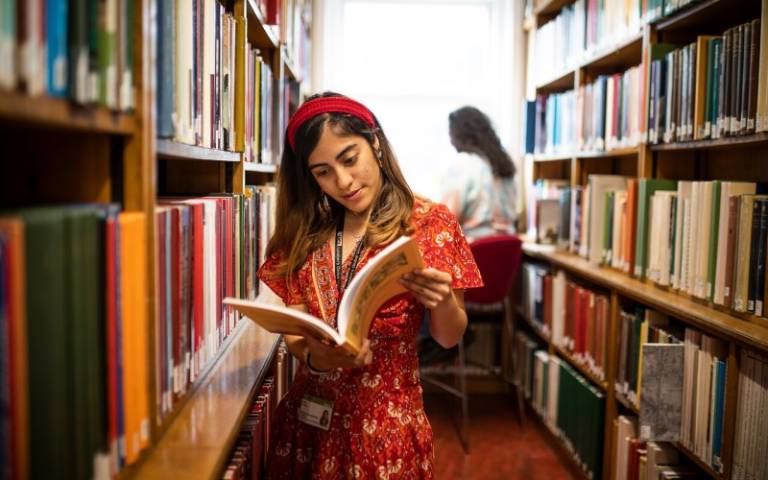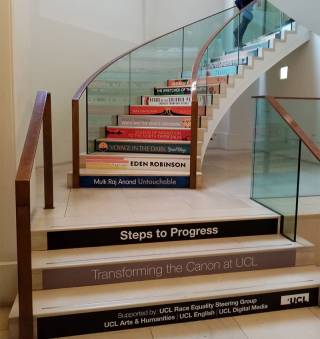Celebrating South Asian Heritage Month 2023
16 August 2023
The Library Liberating the Collections Group have compiled a list of books from recommendations across the UCL community to celebrate South Asian Heritage Month.

This year’s theme is ‘Stories to Tell’. The national organisers have said “Let’s share our stories and create a sense of unity and belonging within our community”.
South Asian Heritage Month takes place across two Western calendar months: 18 July to 17 August. The reason for this is that it respects the traditions of the South Asian solar calendar and the 18 July – 17 August contains several significant dates including the Indian Independence Act gaining royal assent on 18 July 1947 and the publication of the Radcliffe Line on 17 August which lead to Partition. The 17 August is Partition Commemoration Day. The month also covers the Independence Days of several nations in the region.
Your recommendations
Train to Pakistan by Khushwant Singh
I come from a family that was affected by partition of India and Pakistan. Growing up, my grandmother told us how we were the lucky ones, while we moved without any of our belongings at all. Reading this book told me why we were the lucky ones.
Anjum Dhamija
We That Are Young by Preti Taneja
An interesting adaptation of Shakespeare's King Lear!
Jessie Cho
Before we visit the goddess by Chitra Banerjee Divakaruni
It travels with three generations of South Asian women grappling with their sexuality and identity.
Disha Shanbhag
2 states by Chetan Bhagat
It shows a reiteration of stereotypes and cultural differences when it comes to marriage in India and it is shown how the power of love overcomes all judgement and disapproval. It is also quite comedic.
Mallika Ghosh
India - A Sacred Geography by Diana Eck and The Spirit of Indian Painting by B.N. Goswamy
Both these books trace the history of India in different ways. Sacred Geography looks at the Hindu religious history of India and how the geography of India was made by pilgrims and their stories and destinations. Spirit of Indian Painting looks at the Art history of India from 1100-1900 and goes into the details of selected art works.
Deepan Banati
Challenging Destiny: A biography of Chhatrapati Shivaji by Medha Bhaskaran
It gives a very detailed insight into how the Maratha empire came into power in pre-collonial India. A very inspiring book documenting real historical incidents on how the kingdom was established, and about a great leader Chhatrapati Shivaji Maharaj (founder of Maratha Empire in late 1600) who is revered in the entire Indian sub-continent for his progressive views on human rights, the dignity of women and his strong stance against any form of slavery. A must-read for anyone who is trying to explore the history and culture of India.
Akshay Sethia
Remnants of Partition: 21 Objects from a Continent Divided by Aanchal Malhotra
Survivors share their stories using materials to remember personal experiences of partition and stories attached with sentimental pieces. Aanchal Malhotra interviewed people from India, Pakistan and now the UK about their experiences of partition ranging from Muslim, Hindu, Sikh and also White British people in the UK who spent time in British India. One of the best books I've read, I never wanted it to end and thoroughly recommend.
Humma Andleeb
Daughters of Partition by Fozia Raja
It retells the authors grandmothers personal experience of partition as a woman which is rarely the perspective we hear. it is an emotional, upsetting but wonderfully descriptive recollection of her story as someone who migrated, experienced loss, separation from family and a new life in the UK.
Humma Andleeb
Partition Voices by Kavita Puri
A rich collection of short, powerful accounts from people affected by Partition. As a British Panjabi, this is one of the most important and emotional books I have ever read.
Sita in Exile by Rashi Rohatgi
The novella is inspired by the Rāmāyana and draws from Rashi's own experiences. In her own words, her novel focuses on migrant sisterhood and brown motherhood through the lens of an autistic American Desi who moves from Chicago, where Rashi herself went to grad school, to Europe, where she now lives and teaches. Rashi is an alumna of UCL IOE.
The Palace of Illusions by Chitra Banerjee Divakaruni
It retells the story of the Mahabharata from a feminist perspective. A timeless epic, retold from the viewpoint of the female protagonist.
Jyoti Belur
The Good Immigrant by Nikesh Shukla
It brilliantly captures the life of the South Asian diaspora in modern Britain.
Professor Ahmed Rashid
Other Names for Love by Taymour Soomro
It is a recently published debut novel for a young writer who wonderfully balances the duality of personal growth vs the tugging thread of familial responsibility.
Seamus Woolven
Funny boy by Shyam Selvadurai
Story about a young boy who is discovering his sexuality in a close-minded society. The personal becomes the political in this coming of age story set during the Sri Lankan civil war. It also discusses complicated family dynamics.
A Burning by Megha Majumdar
The book is set in Kolkata, India. It is a fictional book that uses the perspectives of three different characters to discuss issues of religious divide, corruption and prejudice. The book gives the reader a glimpse of how political extremism may affect different individuals.
Nagamandala by Girish Karnad
It incorporates folktales while exploring questions about identity and female empowerment in a way that celebrates very distinct elements of south-Asian culture in style of writing and content. Timeless and unique, it’s a must-read play for all things fantastical yet traditional.
Bulbul Malik
Home Fire by Kamila Shamsie
It explores the complexities of British Pakistani Muslims and humanises their struggles in the face of cruel stereotypes of race and religion.
Aroob
Ka: Stories of the Mind and Gods of India by Roberto Calasso
A fascinating and wide ranging book by Roberto Calasso exploring the cultural legacy of ancient India beginning with the Vedas.
Ajita Taware
EmpireLand by Sathnam Sanghera
If British education has failed to address the long lasting impressions of imperialism on modern-day Britain, this book changes that! Although not focused solely on South Asia, this book draws extensive connections between Britain and its former Asian colonies, changing the perspective on what it means to be South Asian in modern-day Britain. Sanghera’s witty anecdotes of a young punjabi boy growing up in the Black Country make the text all the more relatable and engaging.
Tanya
A Place for Us by Fatima Farheen Mirza
It is such a unique novel about the experience of a sectarian minority South-Asian family living in the United States. It is such a wholesome story of the deep existential and identity crisis they face collectively and individually as first and second generation migrants. Trans generational memory and trauma are the central themes and it’s truly a special read for a debut novel.
Mona
The Argumentative Indian by Amartya Sen
Being Indian will definitely make sense after reading this book! How much of traditional Indian identity is evident in contemporary Indian society is eye-opening. Oh, and Sen writes amazingly!!
Tanya
Building Culture by Lekha Sharma
While not a story book in the truest sense this book tells the story of how to build culture in schools, guiding the reader through the process of questioning their own thoughts on leadership. A stunningly useful read.
Nimish Lad
Annihilation of Caste by B.R. Ambedkar
This is a book that is very relevant to present day India and the world’s understanding of India, casteism and racism. I believe it is completely important to include discussing the book ‘Annihilation of Caste’ from secondary-level schooling onward so that we beget a generation of critical thinkers who do not feed and subscribe to the ideas of racism, patriarchy and homophobia in any form or in today’s ‘new’ India.
Sara Mahdi
Equality, Diversity and Inclusion in UCL Library, Culture, Collections and Open Science

 Close
Close

